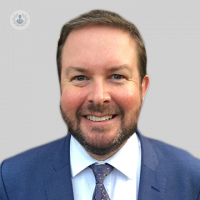Cardiomyopathy essentials: the big questions answered
Written in association with:Cardiomyopathy is a serious heart condition, but there are many types and many questions surrounding it. Professor Gerald Carr-White, a leading cardiologist specialist, has answered these common questions and described cardiomyopathy in further detail for us.

What are the main types of cardiomyopathies and what do they mean?
Cardiomyopathies are normally genetic problems with the muscle of the heart, particularly affecting the main pumping chamber that pumps the blood around the body, which is called the left ventricle. There are different types of cardiomyopathies. The main pumping chamber can be weak and enlarged, which is a dilated cardiomyopathy, or it can be that the walls of the main pumping chamber can be thickened, which is hypertrophic cardiomyopathy. It can also affect the right side of the heart where the main pumping chamber pumps blood to the lungs, and this often occurs in something called arrhythmogenic right ventricular cardiomyopathy. Cardiomyopathies are common and perhaps around 1:200 of the population potentially have some kind of inherited cardiomyopathy. Most people either have very mild symptoms or no symptoms at all.
What are some of the symptoms?
If people do present, some of the typical symptoms we see are shortness of breath, swelling of the tummy or ankles, fast heart rates, dizzy spells or blackouts. Sometimes cardiomyopathies are picked up because we arrange screening for wider family members and typically with the cardiomyopathies, if somebody is involved then first-degree relatives often have a 50/50 chance of carrying the same gene and this can cause problems typically in the teens, 20s and the 30s, but can produce problems at any age.
How is cardiomyopathy diagnosed?
Cardiomyopathy is normally diagnosed with an electrocardiogram to look at the electrics of the heart, and an echocardiogram, which is an ultrasound scan to look at the size, function, and thickness of the chambers of the heart.
What are the treatments for cardiomyopathy?
Most people with cardiomyopathy have relatively minor problems and do not need any treatment, but some people do need tablets to help improve the pumping function of the heart or to stop the blood being obstructed as it comes out of the heart, or to help a weak heart get stronger. Sometimes people are at higher risk of fast or potentially life-threatening fast heart rhythms and with these small minorities we can put in pacemakers or implantable defibrillators to keep people safe. The outlook for people with cardiomyopathy is very good and if you take, for example, dilated cardiomyopathy, around 90 per cent of people will be alive and well at 10 years.
What is the difference between cardiomyopathy and heart failure?
Heart failure is the condition where people are symptomatic with breathlessness and ankle or tummy swelling due to either a stiff or a weak heart. Across the country, the commonest cause of heart failure is coronary artery disease and previous heart attack; and the average age of someone with heart failure is around 79 or 80, and these people often will have four or five other significant comorbidities. For patients with cardiomyopathy who develop these kinds of symptoms, and so do then have a label of heart failure, their outlook is much better than those who are much older with coronary artery disease and multiple other problems.
How does life change after cardiomyopathy diagnosis and treatment?
Once people are treated for cardiomyopathy, most people when they need treatment, see a good improvement in their quality of life and most people live a very normal life. Though, sometimes with cardiomyopathies we do put some constraints on how much exercise people should do, typically staying below a fixed heart rate and perhaps limiting aerobic exercise to under an hour, but that tends to be fine-tuned for specific people depending on their particular diagnosis.
There are some very good websites, such as Cardiomyopathy UK, the British Heart Foundation, and the Arrhythmia Alliance, where there are very useful patient focused information and support groups.
To find out more information or schedule an exam, you schedule a consultation with Professor Carr-White at his Top Doctors profile.


